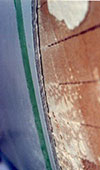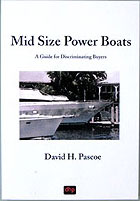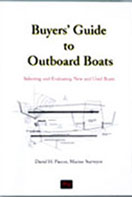Marine Surveying
Pleasure Boats, Yachts & Small Craft Surveys
Articles and Books for Marine Surveyors
by David Pascoe, Marine Surveyor
Browse Articles on:
Surveying blistered boats, cored hull, storm damaged boats, wooden boats, boats with grid liner - insurance survey - hull materials - composites - hull design defects - construction faults - use of moisture meters - law suits and more.
Moisture Meters on Boat Hulls

Do They Produce Reliable Results?
This article and the two months of research that preceded it were prompted by the numerous phone calls and e-mails that I receive from boat buyers asking this question.
They have had surveys performed on boats they propose to buy on which the surveyor used a moisture meter on the hull.
The surveyors gave the results of the meter readings, but were apparently unwilling or unable to provide a comprehensive explanation of those results; at best, these people told me, the surveyor’s advice was vague.
This, of course, left the boat buyer with more questions than were answered. Read Entire Article.
New Materials Again

It seeems the gentleman owns a foam cored boat himself without nary a problem. As a skeptic of foam cores, it's been lonely out here over the years in face of so much promotion and fanfare for the material.
However, he overlooked the point that I never said that foam couldn't be used successfully; it can and it is. Read Entire Article.
Avoiding the Blister Blues

Good Detection and Communication Techniques Critical to Avoiding Complaints
Hull blistering is a problem that has been with us for a quarter-century.
One might think that over a period of twenty-five years this problem would have long since been solved, and no longer be much of a problem for surveyors.
Unfortunately, our research reveals that the blistering of boat bottoms continues to be a growing source of complaints and lawsuits against surveyors.
It seems to be one of those pernicious problems that just won't go away. In fact, the number of lawsuits against surveyors has actually increased dramatically in the last several years. Read Entire Article.
Hull Design Defects Part I

This series of articles is written exclusively for marine surveyors to help identify the wide range of structural defects that can be found in boats and yachts.
Because there is such a diversity in types of hulls, design styles and an ever-expanding array of new construction materials, it is difficult for surveyors to keep up to date on cause-and-effect evaluations. Read Entire Article.
Hull Design Defects Part II

Anyone who has ever seen airframe construction, particularly jet aircraft, understands why aircraft can be built with skins that are extremely thin.
And while an aircraft isn't subjected to the same type of forces as a boat hull, the fuselage is the hull and must be strong in different ways.
Rather than being framed, one could correctly say that an airframe is corrugated, for that's exactly what it is. The skin can be extremely thin because the frames are so close together. Read Entire Article.
Surveying Storm Damaged Boats
Liability Risks for Failure to Report Inadequate Repairs Runs HighWhat prompted me to write this article is that increasingly I am hearing of complaints against surveyors who have failed to discover major damages and structural faults with storm damaged boats.
Since Hurricane Andrew in 1992, the eastern U.S. has been hit with 7 hurricanes that have caused damage to tens, if not hundreds of thousands of boats.
This means that there is nearly an equal number of boats that have been repaired and put back on the market.
In itself, that would not be a problem, except that so many of these damaged boats were sold as salvage to speculators who then made substandard repairs and put them back on the market.Read Entire Article.
Surveying Boats with Molded Integral Grid Systems
Surveyors know that working with liners can cause problems, not only with access for inspection of the internal hull - often they make large parts of the hull inaccessible but because of the difficulties imposed by the design for bonding the liner to the hull.
If the surveyor can't reach the areas, neither can the builder, and so the manner in which it is attached to the hull has to be suspect unless proven otherwise. Read Entire Article.
Surveyor's Guide to Insurance Surveys
The insurance survey, Condition and Value survey or C&V as it is often referred to, is a type of survey intended for use by insurance companies for evaluating whether or not they wish to insure a particular vessel.
For over 30 years surveyors have been providing this type of survey. But, unfortunately, the insurance industry has never set a standard as to the nature and extent of information that they require, and so surveyors have largely been left to guess at the kind of information that different insurance companies want.
This guide will assist the surveyor in identifying the most appropriate information to be covered in the survey and report. Read Entire Article.
How to Survey A Wood Hull

Let start with the point that most independent surveyors I know are no longer in the business of performing prepurchase surveys on wooden boats and the reason is simple.
Surveyors have learned the hard way that surveying wood boats is very difficult and fraught with risks. Read Entire Article.
EL TORO Tragedy, The

Sinking of Party Fishing Vessel "EL TORO II"
An Independent Review of the Coast Guard Investigation Report
The EL TORO is a story of particular interest to marine surveyors that reveals some hard-learned lessons.
EL TORO was a Coast Guard certified passenger carrying vessel that had just undergone its drydock inspection on March 23, 1993, little more than 8 months prior. In addition, an insurance survey was completed just 5 days before the loss of the EL TORO.
Both of these are factors which will come into play, as we shall soon see, that provide some very important lessons for surveyors. Read Entire Article.
EL TORO Addendum
Law Suit - Sinking of Party Fishing Vessel "EL TORO II"As most surveyors know, whether you're right or wrong is ultimately irrelevant in the face of a major lawsuit.
A defense of this magnitude would bankrupt the surveyor even in the initial stages, yet alone a case involving multiple plaintiffs and defendants that drags on for years.
And in the EL TORO case, the surveyor is a direct employee of the insurer, and yet he is not immune to being sued personally. Read Entire Article.
EL TORO II: The NTSB Report

As with the CG report, I was impressed that the NTSB also seems to go out of its way to absolve everyone but the insurance surveyor.
As with the CG report, this one also discusses the insurance surveyor's role and leaves the reader hanging whether the insurance surveyor should have informed the vessel owner of his findings.
Yet this report also finds that neither the vessel owner nor the CG made any mistakes. Read Entire Article.
From Other Categories
Hi Tech Materials in Boat Building

The Pros and Cons of Space Age Materials in Boat Building. What it Means for the Consumer.
The boat building industry has entered an unprecedented period of experimentation of new materials for use in the fabrication of what were once called fiberglass hulls.
Those of us who have been around the boat building scene for a while have seen a lot of new ideas and materials come and go over the years.
Some have met with success, but many have met with failure, or one way or another have proved unsuitable for building production-line boats. Read Entire Article.
David Pascoe - Biography
 Visit davidpascoe.com for his power boat books
Visit davidpascoe.com for his power boat books David Pascoe - Biography
David Pascoe is a second generation marine surveyor in his family who began his surveying career at age 16 as an apprentice in 1965 as the era of wooden boats was drawing to a close.
Certified by the National Association of Marine Surveyors in 1972, he has conducted over 5,000 pre purchase surveys in addition to having conducted hundreds of boating accident investigations, including fires, sinkings, hull failures and machinery failure analysis.
Over forty years of knowledge and experience are brought to bear in following books. David Pascoe is the author of:
- "Mid Size Power Boats" (2003)
- "Buyers’ Guide to Outboard Boats" (2002)
- "Surveying Fiberglass Power Boats" (2001, 2nd Edition - 2005)
- "Marine Investigations" (2004).
In addition to readers in the United States, boaters and boat industry professionals worldwide from nearly 80 countries have purchased David Pascoe's books, since introduction of his first book in 2001.
In 2012, David Pascoe has retired from marine surveying business at age 65.
On November 23rd, 2018, David Pascoe has passed away at age 71.
















David Pascoe is a second generation marine surveyor in his family who began his surveying career at age 16 as an apprentice in 1965 as the era of wooden boats was drawing to a close.
Certified by the National Association of Marine Surveyors in 1972, he has conducted over 5,000 pre purchase surveys in addition to having conducted hundreds of boating accident investigations, including fires, sinkings, hull failures and machinery failure analysis.
Over forty years of knowledge and experience are brought to bear in following books. David Pascoe is the author of:
In addition to readers in the United States, boaters and boat industry professionals worldwide from nearly 80 countries have purchased David Pascoe's books, since introduction of his first book in 2001.
In 2012, David Pascoe has retired from marine surveying business at age 65.
On November 23rd, 2018, David Pascoe has passed away at age 71.
Biography - Long version